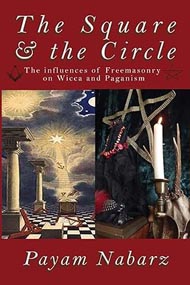The Square and the Circle
The Influences of Freemasonry on Wicca and Paganism
Payam Nabarz
Published by Avalonia, 2016
"It is said that all religions borrow from what came before
despite this being often fiercely contested by its adherents. The family tree of
Wicca has some odd bedfellows, of which the most prominent and perhaps
surprising is Freemasonry; which, with its strict governing body and fixed
catechisms seem almost a polar opposite of what is seen in Wicca.
The history and details of this relationship and the processes and people
which intertwined them are here laid bare for the reader to see with a detailed
and useful bibliography available for futher study."
- Ric Lovett, Pagan, Wiccan and Past Master.
On the face of it, nothing could be futher apart than Wicca, a Goddess/God-centric
modern Pagan mystery school whose Rede is "An it harm none, do what ye will",
and Freemasonry, a brotherhood/sisterhood and system of morality veiled in
allegory, taught in a symbolic language, whose great principles are brotherly
love, relief, and truth. But the connections between them are closer than might
at first appear.
The Square and the Circle reviews the literature of the history of Wicca with
especial reference to its links with Freemasonry, demonstrating their surprisingly
close historical affiliations. In addition the links between Freemasonry
Druidry, Sufism, and other modern Pagan movements are also examined.
"For these truly are the five points of fellowship feet to feet, knee to knee,
groin to groin, breast to breast, arms around back, lips to lips"
- Wiccan Book of Shadows
"I will defend the Five Points of Fellowship, in enactment as well as concept..."
- Freemasonry's third-degree initiation
In the heart of both Freemasonry and Wicca, there is the spiritual quest and
journey, as in many other mystery schools. Freemasons begin as a rough ashlar
stone and eventually transform to a perfect cube. Its study of the seven liberal
arts and sciences educates their initiates, transforming their minds to become a
living Temple to the Great Architect, while the seven graces provide them with
the moral compass to walk through daily life.
(The text above comes from the back of the book)



